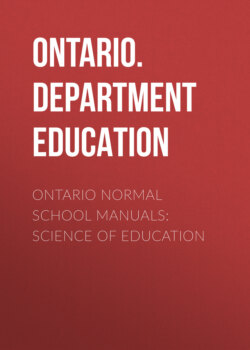Читать книгу Ontario Normal School Manuals: Science of Education - Ontario. Department of Education - Страница 29
На сайте Литреса книга снята с продажи.
THE SCHOOL
ОглавлениеTable of Contents
As man, in the progress of civilization, became more fully conscious of the worth of human life and of the possibilities of its development through educational effort, the providing of special instruction for the young naturally began to be recognized as a duty. As this duty became more and more apparent, it gave rise, on the principle of the division of labour, to corporate, or institutional, effort in this direction. By this means there has been finally developed the modern school as a fully organized corporate institution devoted to educational work, and supported as an integral part of our civil or public obligations.
Origin of the School.—To trace the origin of the school, it will be necessary to look briefly at certain marked stages of the development of civilization. The earliest and simplest forms of primitive life suggest a time when the family constituted the only type of social organization. In such a mode of life, the principle of the division of labour would be absent, the father or patriarch being the family carpenter, butcher, doctor, judge, priest, and teacher. In the two latter capacities, he would give whatever theoretic or practical instruction was received by the child. As soon, however, as a tribal form of life is met, we find the tribe or race collecting a body of experience which can be retained only by entrusting it to a selected body. This experience, or knowledge, is at first mainly of a religious character, and is possessed and handed on by a body of men forming a priesthood. Such priestly bodies, or colleges, may be considered the earliest special organizations devoted to the office of teaching. As civilization gradually advanced, a mass of valuable practical knowledge relative to man's environment was secured and added to the more theoretic forms. As this practical knowledge became more complex, there was felt a greater need that the child should be made acquainted with it in some systematic manner during his early years. Thus developed the conception of the school as an instrument by which such educative work might be carried on more effectively. On account of the constant increase of practical knowledge and its added importance in directing the political and economic life of the people, the civil authorities began in time to assume control of secular education. Thus the government of the school as an institution gradually passed to the state, the teacher taking the place of the priest as the controlling agent in the education of the young.
